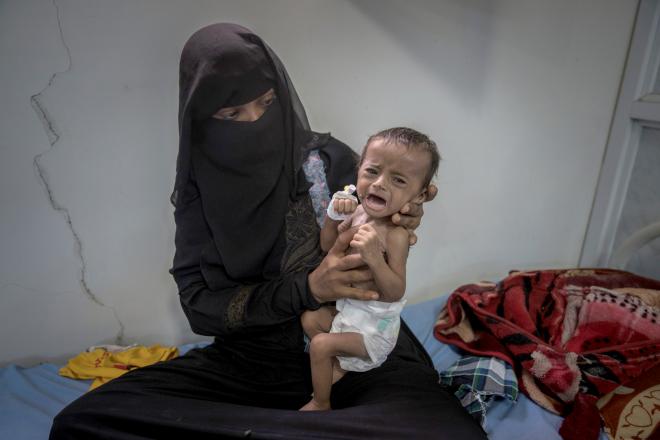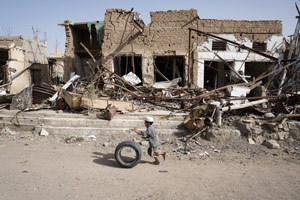Yemen Has Become ‘Hell on Earth’
Published on February, 30 2018
Saleh is four months old and severely malnourished. His 22-year-old mother, Nora, already has five children. Photo: Giles Clarke/UNOCHA
By Odile Hugonot Haber, co-chair of the Middle East Committee
“This place is hell on Earth” says 25-year-old Lutf Alsanani, a Sana’a resident.
15,489 air raids have been recorded from the period between March 25, 2015 and December 15, 2017. They struck farms, schools, hospitals, market places, historical buildings, and mosques. The strikes are carried out by the Saudi-led military coalition.
The Saudi-led coalition includes the US, the United Kingdom, France, and the United Arab Emirates; all sell weapons to the Saudis. The US in particular also helps to refuel planes.
The War in Yemen, a country of 28 million, is an ongoing conflict that began in 2015 between two Yemeni factions. The former president, Ali Abdullah Saleh, was allied to the Houthi tribal religious forces, controlling Sana’a, the capital, and this group clashed with forces loyal to the government of Abdrabbush Mansur Hadi, based in Hadden.
Then the Saudis got involved, taking sides with the Hadi faction and claiming that the Houthis were given arms by Iran. The conflict became a proxy war of sorts, between Iran and the Saudis. Iran has repeatedly denied being involved and their intervention has not been proven, but Iran’s alleged involvement allows the Saudis and their coalition to claim that their intervention is justified.
The result is that there are an estimated 18,000 people killed, and 3-4 million left homeless. Thousands are refugees.
 Famine threatens the lives of millions of survivors, as long as the blockade continues in Northern ports. Diseases are threatening them, with cholera developing on a large scale and already killing many people.
Famine threatens the lives of millions of survivors, as long as the blockade continues in Northern ports. Diseases are threatening them, with cholera developing on a large scale and already killing many people.
The whole country’s infrastructure has been destroyed. Yemen was already one of the poorest countries in the Middle East, now it is a disaster area.
Please call you Congress representative and tell them “No arms for the Saudis.”
Obama ‘s administration had offered a $110 billion weapons deal to Saudi Arabia, and now Trump claims he made another $110 billion deal with Saudi Arabia.
In June 2017 the Senate rejected an effort to block a $500 million portion of this weapons deal to Saudi Arabia; the effort failed 47-53.
Call your representatives and protest these arm deals, ask that the war in Yemen be stopped, to open the blockade to let in food and medications.
Sources for this article include:
Faisal Edroos & Ahmad Algohbary, 1,000 days of war in Yemen, 'land of blood and bombs', aljazeera.com, December 20, 2017
How-and Why-to End the War in Yemen, The Economist, November 30, 2017
Inset photo: Giles Clarke/UNOCHA



